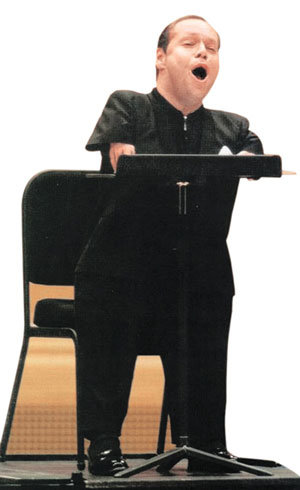Man with the Big Voice

One morning in February, at a hotel restaurant in Berlin, Germany, I saw a seemingly small boy wander in. As the reporter approached him, his eyes widened, as if the sudden nearness of an Asian startled him.
Mr. Quasthoff? A pleasure to meet you. I am a Dong-A Ilbo journalist from Korea, here to interview Berlin Philharmonic music director Simon Rattle.
Is that so! Rattle is a great, friendly guy. Good luck in your interview.
Please come sing in Korea sometime.
Thank you. I hope that will happen.
I wondered whether I should ask for a handshake, and then decided against it. I thought maybe a physically challenged person with hands stuck onto his shoulders wouldnt appreciate the gesture. Thomas Quasthoff is a world class bass baritone who has been awarded Germanys highest music honor, Echo, and is a two-time Grammy winner. It was a brief meeting with him. Todays featured book is an autobiography of a 132-centimeter dwarf with only seven fingers, a small giant who overcame his handicap to rise to international fame as a vocalist.
He was born in 1959 almost without arms and legs. His mother had taken thalidomide (a medicine that was used for morning sickness in the 1950s and was discontinued due to birth deformities) during her pregnancy. Carefully swabbing at the mess of sweat and excrement on her son who couldnt stand or relieve himself alone, his mother held him close and cried.
Fortunately, he wasnt born into a gloomy family struggling with poverty. His parents enjoyed listening to music and singing. After his vocalist father went on TV with an amateur composer and won the contest, the mirth of song became even greater to the family. Despite his small stature, Thomas was the possessor of a lusty voice and soon grew into a renowned singer under the guidance of a warm and skillful beauty, soprano Charlotte Lehmann.
It wasnt that the world loved him unconditionally. Deans who would make excuses to prevent his admission into music schools and competitors who would jeer at his victory at concerts, spitting out, Youve got an advantage because youre handicapped, were out there aplenty. But he understood the difference between ridiculing to insult and advice to encourage.
When Joachim Kaiser, called the Kaiser (emperor) of music criticism in Germany, pointed out, Your expression, passion, and harmony are wanting yet, Quasthoff felt a surge of strength at the thought, Here is someone who treats me like a real singer.
Last year, seeing him on stage at the Bayreuther Festival, Kaiser raved, The acting of the wounded and pained King Amfortas was just like the materialization of his own agony.
Today, standing on top of a 50-centimeter platform, he melts the hearts of people around the world with his reverberating voice. Without the love and trust of my parents, all of my success would have been impossible. They tell me they wish for nothing more than for my happiness. So I will never be in despair.
Yoon-Jong Yoo gustav@donga.com



![[김순덕의 도발] ‘李부터 연임’ 개헌, 이 대통령은 가능성을 말했다](https://dimg.donga.com/c/138/175/90/1/wps/NEWS/IMAGE/2026/01/16/133172656.1.jpg)



